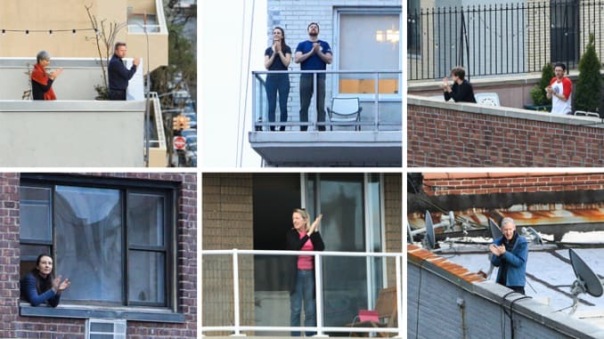Sebahate J. Shala
IT’S the 32nd day since I’m locked home. At 7:00 PM, I open my window and join claps and chorus of my neighbors in gratitude for health workers across America and the world. It’s the eleventh day in Manhattanville. The New York City started in late March. Ding-ding-ding, dang-dang-dang, ding-ding-ding, I hit an empty bottle of glass. My body shudders. My heart aches. I can’t hold my tears. I cry. But I am not alone.
The noisemaking is becoming louder and louder as the number of cases is getting higher and higher. 662,441 in U.S. 222,284 in New York. 2,172,032 in the planet. It all starts with a car buzzing and riding along Broadway, and then, in a second, everybody is out, clapping, chanting, cheering, drumming, banging pots and pans…Those who happen to be in the streets join the ritual. A sense of unity and solidarity. An alternative, creative communication. We Are All in This Together!
The idea turns me back to 1990. Every evening, my sister Luljeta and I, same as thousands of Kosovo Albanians, went out in our balconies and doorsteps to hit tin vessels and mess tins in revolt to Slobodan Milosevic’s violent campaign against ethnic Albanians following the revocation of Kosovo autonomy in 1989, as well as to show the world what was happening in Kosovo. It was an alarming bell, a wake-up call, or so we hoped!
30 years later, Kosovars would “waylay” their windows and balconies again, though this time not to oppose Serbia violence against them nor to appreciate essential workers in the frontline as the world is doing, but in support of Government “Kurti”—toppled in the midst of the COVID-19 crisis after a no confidence vote in the Parliament. On the day it started, I cried when I watched videos shared on social media from my fellows. I cried and I cried when I saw a video showing my nephews, Peon (8) and Liri (5), joyfully banging pots and pans. With a sense of pride and the feeling of contributing to “something,” they joined the crowd of the adults, surely, not knowing the reason why they were doing what they were doing. One day, they will learn it. I cried and I cried because “all this thing” was a reminiscence of my early adulthood, our peaceful protest and resistance against Serbia repressive regime, our struggles for freedom and independence, our suffering as oppressed people. I cried and I cried because it brought me back memories with my sister, Luljeta, our childhood, our social and political activism, our determination to freedom and liberty. I cried and I cried because Luljeta wasn’t there to rejoin her peers and to witness the humanity unfolding the worst and its best. I cried and I cried because neither was I there to solidarize with my compatriots, this time, for a different cause and in different circumstances. I cried and cried because the world was in suffering, because the human life was at stake. I cried and I cried, so hard, that day.
The idea of applauding, cheering, chanting, singing arias, and playing instruments out of windows and balconies as a thank you to front-line medical heroes began in Italy, the country hit the hardest from COVID-19, ranked—until most recently—first in the world for the number of infected people and deaths. Then, it spread in Madrid, Paris, Athens, Amsterdam, Istanbul and London even though, people, as the Time wrote, “know their intended audience is too busy to listen to them.” The media shared a picture of British Prime Minister, Johnson, who tested positive, clapping from his balcony at 10 Downing St, too. But not the U.S. President Trump.
In the worst ongoing pandemic in our lifetime as a result of which people are locked in their homes, clapping out of windows is a new, creative way of communication. As French Prime Minister Philippe said, “In this period of crisis, we are going to see the most beautiful things humanity has to offer, but also perhaps the darkest.”
Clapping, as the Atlantic notes, is a common sound people use without voice chords, a social gesture to show approval and admiration usually in groups or crowds, and a remarkably stable facet of human culture. The Bible defines it as acclamation and celebration (2013). The history of clapping dates back to 6th century, BC, where audiences in Athens were required to clap in approval of their leader. In 7th century, AD, in Rome, the emperor Heraclius hired a group of men with a special mission—to applaud for him as tactic of intimidation-by-noisemaking in attempt to intimidate his opponent in the time when Roman empire was falling.
Oh, and most recently, the House Speaker Pelosi clapped at president Trump during his address of the “State of Union”—but not sarcastically—as was interpreted by the public but as a welcoming gesture on Trump’s remarks to “reject the politics of revenge, resistance and retribution and embrace the boundless potential of cooperation, compromise and the common good.”
Next: Diary in the Time of Coronavirus COVID-19: Fear (II)

Photo: New Yorkers Clapping at Health Care Workers. Source: CNBC.
